Reflective Learning, Feedback, and Assessment in Higher Education
VerifiedAdded on 2023/06/11
|7
|1965
|82
Essay
AI Summary
This essay delves into the significance of reflective learning practices in higher education, utilizing Gibbs' reflective cycle to analyze experiences and actions for skill development and knowledge acquisition. It examines the nature of feedback and feedforward, differentiating between formative and summative assessments, and emphasizes their role in enhancing student performance. The essay further explores how a reflective approach to feedback and feedforward can improve future assessments by addressing learning gaps and fostering critical thinking. Ultimately, it concludes that reflective practices and constructive feedback are essential for boosting student morale, achieving learning goals, and promoting continuous improvement in higher education.
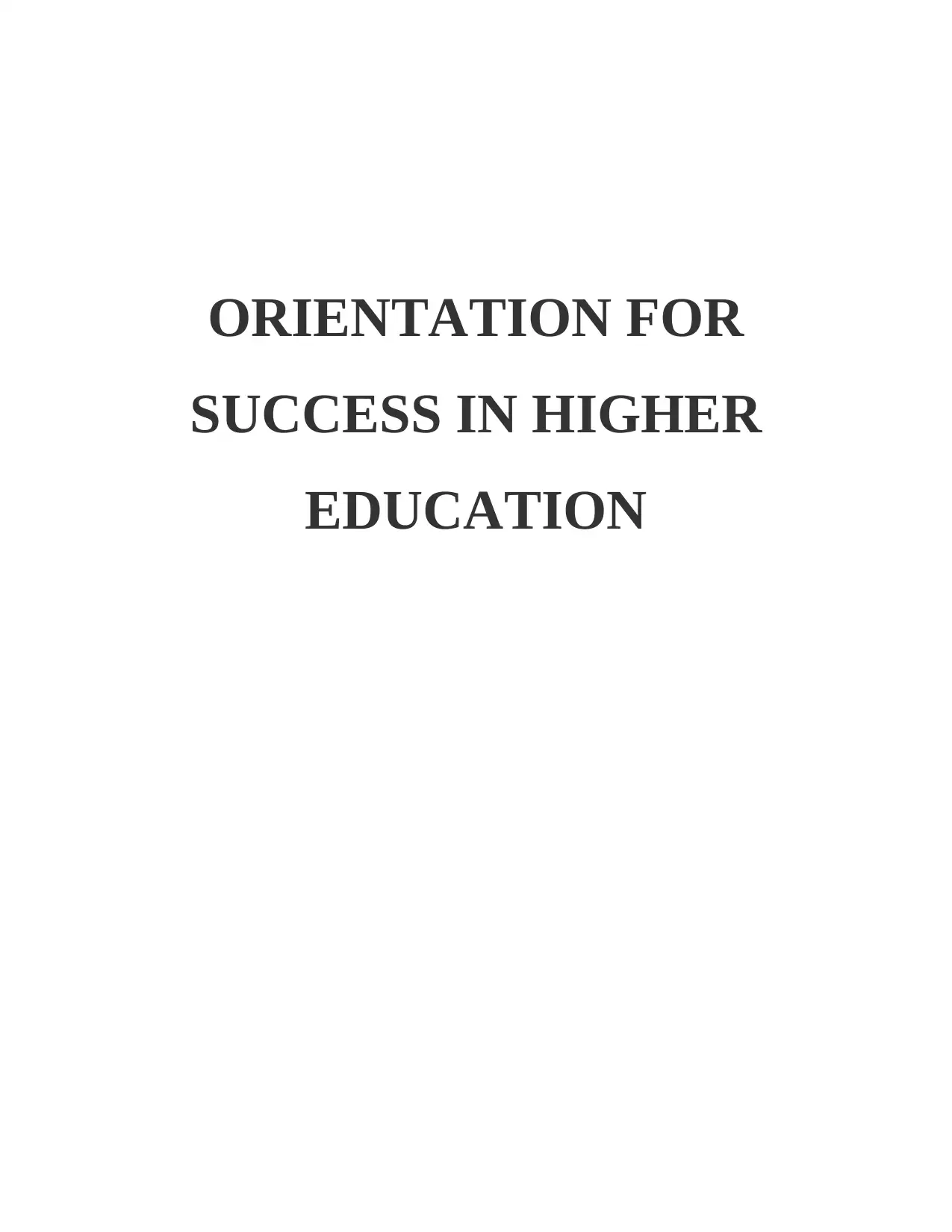
ORIENTATION FOR
SUCCESS IN HIGHER
EDUCATION
SUCCESS IN HIGHER
EDUCATION
Paraphrase This Document
Need a fresh take? Get an instant paraphrase of this document with our AI Paraphraser
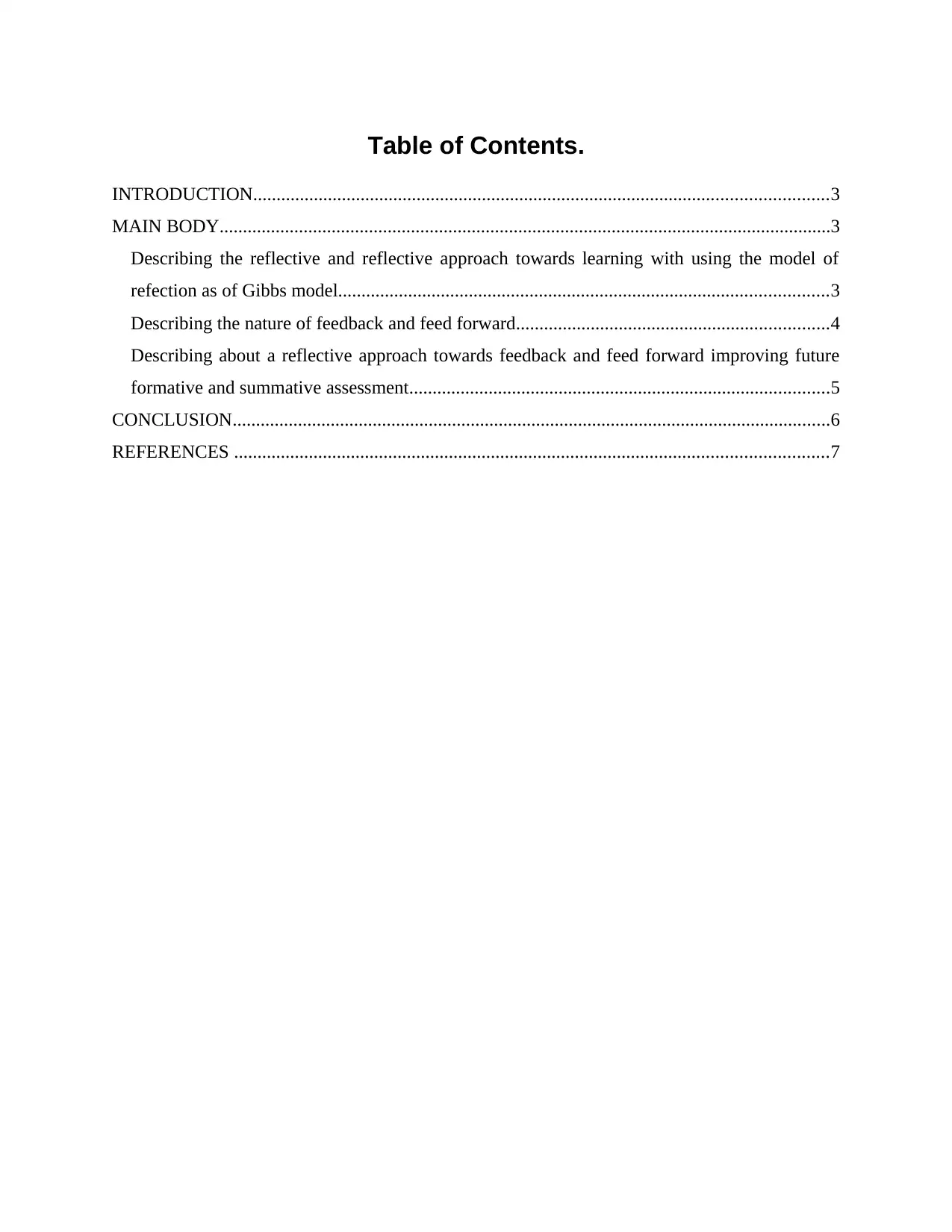
Table of Contents.
INTRODUCTION...........................................................................................................................3
MAIN BODY...................................................................................................................................3
Describing the reflective and reflective approach towards learning with using the model of
refection as of Gibbs model.........................................................................................................3
Describing the nature of feedback and feed forward...................................................................4
Describing about a reflective approach towards feedback and feed forward improving future
formative and summative assessment..........................................................................................5
CONCLUSION................................................................................................................................6
REFERENCES ...............................................................................................................................7
INTRODUCTION...........................................................................................................................3
MAIN BODY...................................................................................................................................3
Describing the reflective and reflective approach towards learning with using the model of
refection as of Gibbs model.........................................................................................................3
Describing the nature of feedback and feed forward...................................................................4
Describing about a reflective approach towards feedback and feed forward improving future
formative and summative assessment..........................................................................................5
CONCLUSION................................................................................................................................6
REFERENCES ...............................................................................................................................7
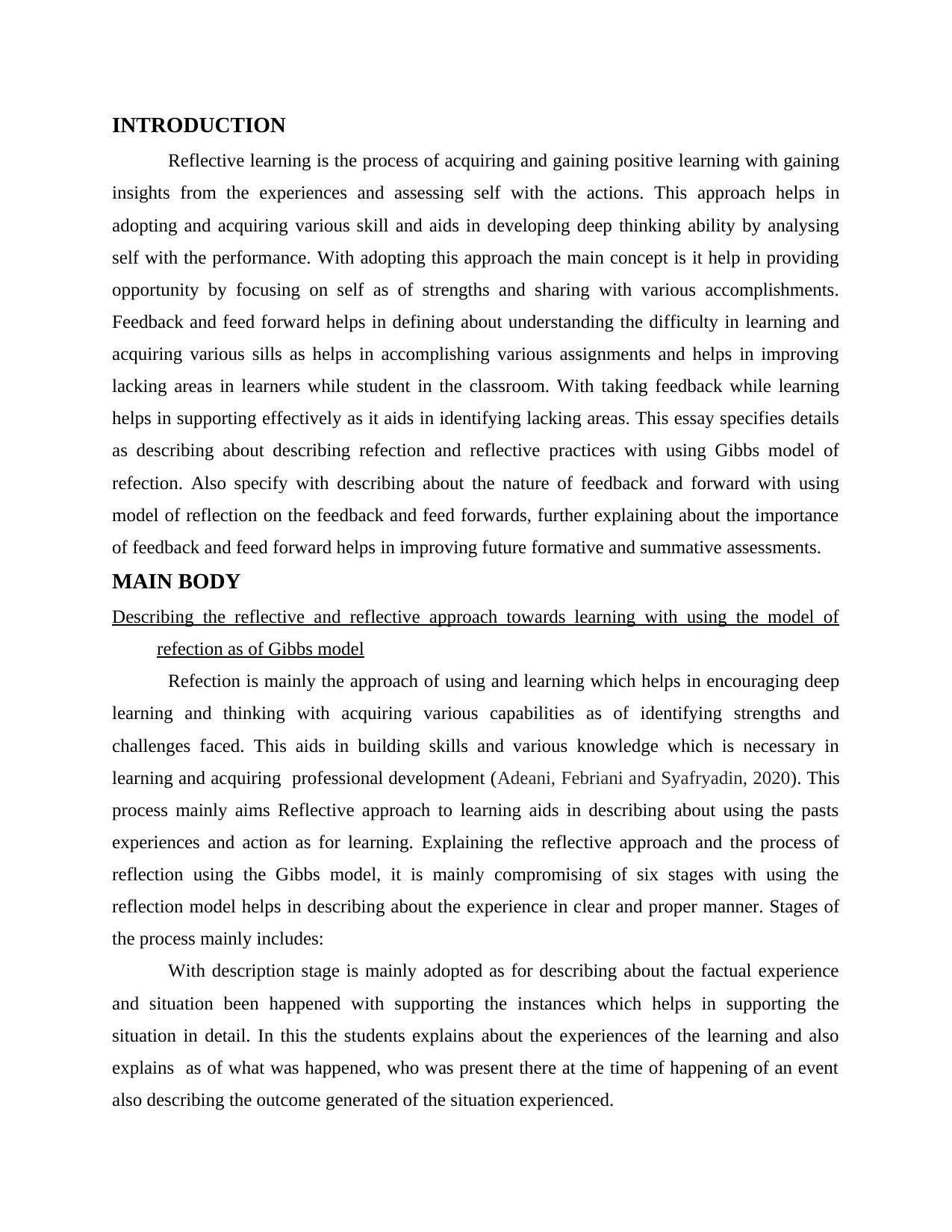
INTRODUCTION
Reflective learning is the process of acquiring and gaining positive learning with gaining
insights from the experiences and assessing self with the actions. This approach helps in
adopting and acquiring various skill and aids in developing deep thinking ability by analysing
self with the performance. With adopting this approach the main concept is it help in providing
opportunity by focusing on self as of strengths and sharing with various accomplishments.
Feedback and feed forward helps in defining about understanding the difficulty in learning and
acquiring various sills as helps in accomplishing various assignments and helps in improving
lacking areas in learners while student in the classroom. With taking feedback while learning
helps in supporting effectively as it aids in identifying lacking areas. This essay specifies details
as describing about describing refection and reflective practices with using Gibbs model of
refection. Also specify with describing about the nature of feedback and forward with using
model of reflection on the feedback and feed forwards, further explaining about the importance
of feedback and feed forward helps in improving future formative and summative assessments.
MAIN BODY
Describing the reflective and reflective approach towards learning with using the model of
refection as of Gibbs model
Refection is mainly the approach of using and learning which helps in encouraging deep
learning and thinking with acquiring various capabilities as of identifying strengths and
challenges faced. This aids in building skills and various knowledge which is necessary in
learning and acquiring professional development (Adeani, Febriani and Syafryadin, 2020). This
process mainly aims Reflective approach to learning aids in describing about using the pasts
experiences and action as for learning. Explaining the reflective approach and the process of
reflection using the Gibbs model, it is mainly compromising of six stages with using the
reflection model helps in describing about the experience in clear and proper manner. Stages of
the process mainly includes:
With description stage is mainly adopted as for describing about the factual experience
and situation been happened with supporting the instances which helps in supporting the
situation in detail. In this the students explains about the experiences of the learning and also
explains as of what was happened, who was present there at the time of happening of an event
also describing the outcome generated of the situation experienced.
Reflective learning is the process of acquiring and gaining positive learning with gaining
insights from the experiences and assessing self with the actions. This approach helps in
adopting and acquiring various skill and aids in developing deep thinking ability by analysing
self with the performance. With adopting this approach the main concept is it help in providing
opportunity by focusing on self as of strengths and sharing with various accomplishments.
Feedback and feed forward helps in defining about understanding the difficulty in learning and
acquiring various sills as helps in accomplishing various assignments and helps in improving
lacking areas in learners while student in the classroom. With taking feedback while learning
helps in supporting effectively as it aids in identifying lacking areas. This essay specifies details
as describing about describing refection and reflective practices with using Gibbs model of
refection. Also specify with describing about the nature of feedback and forward with using
model of reflection on the feedback and feed forwards, further explaining about the importance
of feedback and feed forward helps in improving future formative and summative assessments.
MAIN BODY
Describing the reflective and reflective approach towards learning with using the model of
refection as of Gibbs model
Refection is mainly the approach of using and learning which helps in encouraging deep
learning and thinking with acquiring various capabilities as of identifying strengths and
challenges faced. This aids in building skills and various knowledge which is necessary in
learning and acquiring professional development (Adeani, Febriani and Syafryadin, 2020). This
process mainly aims Reflective approach to learning aids in describing about using the pasts
experiences and action as for learning. Explaining the reflective approach and the process of
reflection using the Gibbs model, it is mainly compromising of six stages with using the
reflection model helps in describing about the experience in clear and proper manner. Stages of
the process mainly includes:
With description stage is mainly adopted as for describing about the factual experience
and situation been happened with supporting the instances which helps in supporting the
situation in detail. In this the students explains about the experiences of the learning and also
explains as of what was happened, who was present there at the time of happening of an event
also describing the outcome generated of the situation experienced.
⊘ This is a preview!⊘
Do you want full access?
Subscribe today to unlock all pages.

Trusted by 1+ million students worldwide
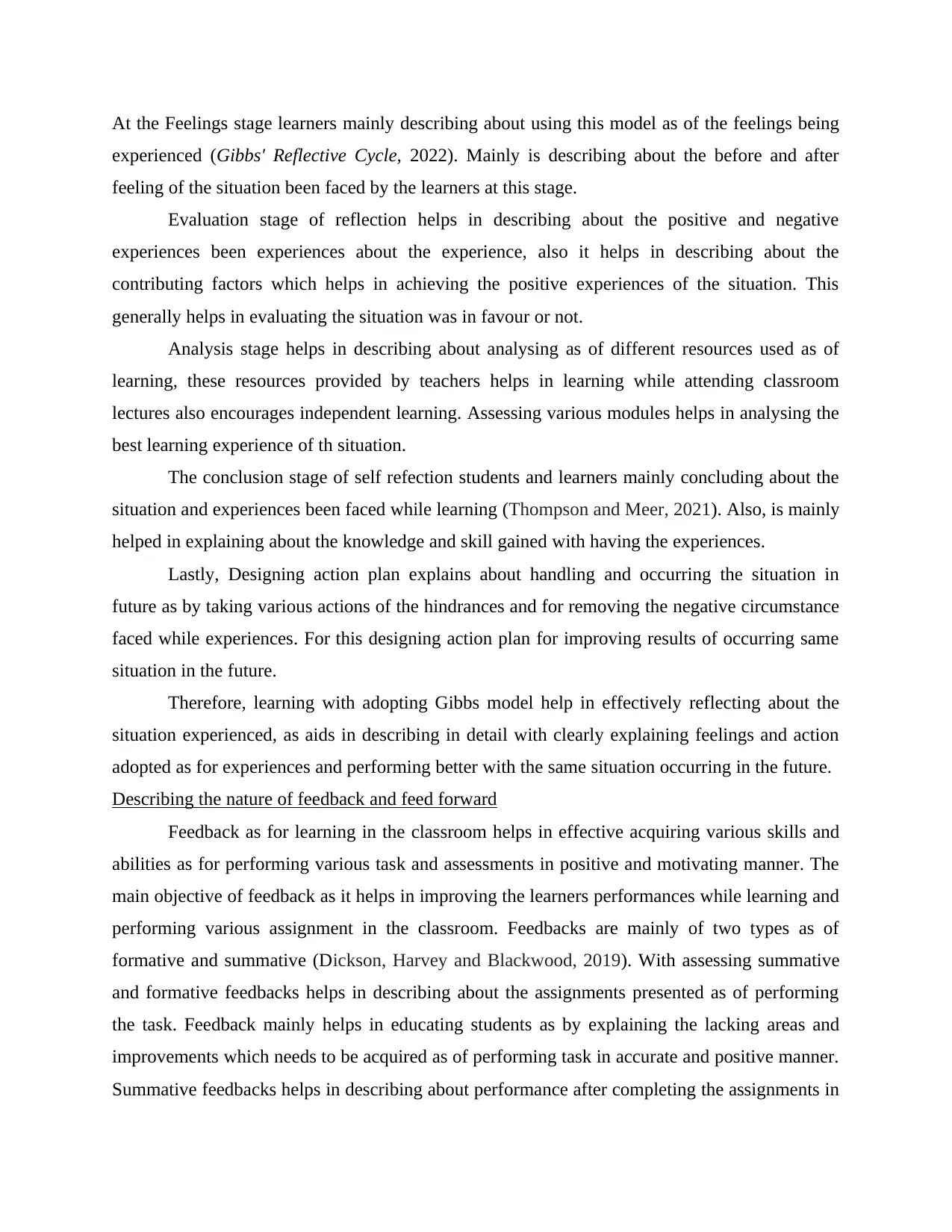
At the Feelings stage learners mainly describing about using this model as of the feelings being
experienced (Gibbs' Reflective Cycle, 2022). Mainly is describing about the before and after
feeling of the situation been faced by the learners at this stage.
Evaluation stage of reflection helps in describing about the positive and negative
experiences been experiences about the experience, also it helps in describing about the
contributing factors which helps in achieving the positive experiences of the situation. This
generally helps in evaluating the situation was in favour or not.
Analysis stage helps in describing about analysing as of different resources used as of
learning, these resources provided by teachers helps in learning while attending classroom
lectures also encourages independent learning. Assessing various modules helps in analysing the
best learning experience of th situation.
The conclusion stage of self refection students and learners mainly concluding about the
situation and experiences been faced while learning (Thompson and Meer, 2021). Also, is mainly
helped in explaining about the knowledge and skill gained with having the experiences.
Lastly, Designing action plan explains about handling and occurring the situation in
future as by taking various actions of the hindrances and for removing the negative circumstance
faced while experiences. For this designing action plan for improving results of occurring same
situation in the future.
Therefore, learning with adopting Gibbs model help in effectively reflecting about the
situation experienced, as aids in describing in detail with clearly explaining feelings and action
adopted as for experiences and performing better with the same situation occurring in the future.
Describing the nature of feedback and feed forward
Feedback as for learning in the classroom helps in effective acquiring various skills and
abilities as for performing various task and assessments in positive and motivating manner. The
main objective of feedback as it helps in improving the learners performances while learning and
performing various assignment in the classroom. Feedbacks are mainly of two types as of
formative and summative (Dickson, Harvey and Blackwood, 2019). With assessing summative
and formative feedbacks helps in describing about the assignments presented as of performing
the task. Feedback mainly helps in educating students as by explaining the lacking areas and
improvements which needs to be acquired as of performing task in accurate and positive manner.
Summative feedbacks helps in describing about performance after completing the assignments in
experienced (Gibbs' Reflective Cycle, 2022). Mainly is describing about the before and after
feeling of the situation been faced by the learners at this stage.
Evaluation stage of reflection helps in describing about the positive and negative
experiences been experiences about the experience, also it helps in describing about the
contributing factors which helps in achieving the positive experiences of the situation. This
generally helps in evaluating the situation was in favour or not.
Analysis stage helps in describing about analysing as of different resources used as of
learning, these resources provided by teachers helps in learning while attending classroom
lectures also encourages independent learning. Assessing various modules helps in analysing the
best learning experience of th situation.
The conclusion stage of self refection students and learners mainly concluding about the
situation and experiences been faced while learning (Thompson and Meer, 2021). Also, is mainly
helped in explaining about the knowledge and skill gained with having the experiences.
Lastly, Designing action plan explains about handling and occurring the situation in
future as by taking various actions of the hindrances and for removing the negative circumstance
faced while experiences. For this designing action plan for improving results of occurring same
situation in the future.
Therefore, learning with adopting Gibbs model help in effectively reflecting about the
situation experienced, as aids in describing in detail with clearly explaining feelings and action
adopted as for experiences and performing better with the same situation occurring in the future.
Describing the nature of feedback and feed forward
Feedback as for learning in the classroom helps in effective acquiring various skills and
abilities as for performing various task and assessments in positive and motivating manner. The
main objective of feedback as it helps in improving the learners performances while learning and
performing various assignment in the classroom. Feedbacks are mainly of two types as of
formative and summative (Dickson, Harvey and Blackwood, 2019). With assessing summative
and formative feedbacks helps in describing about the assignments presented as of performing
the task. Feedback mainly helps in educating students as by explaining the lacking areas and
improvements which needs to be acquired as of performing task in accurate and positive manner.
Summative feedbacks helps in describing about performance after completing the assignments in
Paraphrase This Document
Need a fresh take? Get an instant paraphrase of this document with our AI Paraphraser
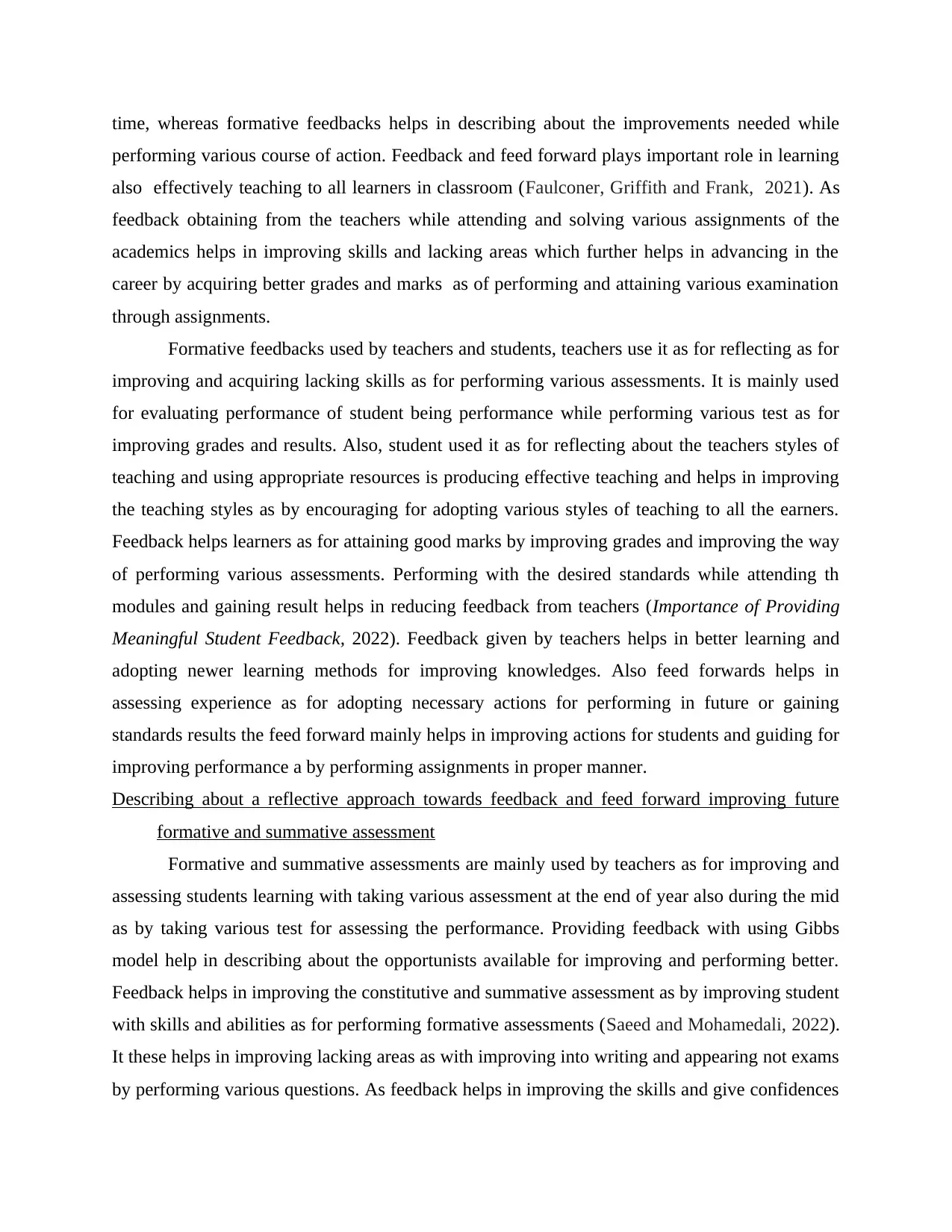
time, whereas formative feedbacks helps in describing about the improvements needed while
performing various course of action. Feedback and feed forward plays important role in learning
also effectively teaching to all learners in classroom (Faulconer, Griffith and Frank, 2021). As
feedback obtaining from the teachers while attending and solving various assignments of the
academics helps in improving skills and lacking areas which further helps in advancing in the
career by acquiring better grades and marks as of performing and attaining various examination
through assignments.
Formative feedbacks used by teachers and students, teachers use it as for reflecting as for
improving and acquiring lacking skills as for performing various assessments. It is mainly used
for evaluating performance of student being performance while performing various test as for
improving grades and results. Also, student used it as for reflecting about the teachers styles of
teaching and using appropriate resources is producing effective teaching and helps in improving
the teaching styles as by encouraging for adopting various styles of teaching to all the earners.
Feedback helps learners as for attaining good marks by improving grades and improving the way
of performing various assessments. Performing with the desired standards while attending th
modules and gaining result helps in reducing feedback from teachers (Importance of Providing
Meaningful Student Feedback, 2022). Feedback given by teachers helps in better learning and
adopting newer learning methods for improving knowledges. Also feed forwards helps in
assessing experience as for adopting necessary actions for performing in future or gaining
standards results the feed forward mainly helps in improving actions for students and guiding for
improving performance a by performing assignments in proper manner.
Describing about a reflective approach towards feedback and feed forward improving future
formative and summative assessment
Formative and summative assessments are mainly used by teachers as for improving and
assessing students learning with taking various assessment at the end of year also during the mid
as by taking various test for assessing the performance. Providing feedback with using Gibbs
model help in describing about the opportunists available for improving and performing better.
Feedback helps in improving the constitutive and summative assessment as by improving student
with skills and abilities as for performing formative assessments (Saeed and Mohamedali, 2022).
It these helps in improving lacking areas as with improving into writing and appearing not exams
by performing various questions. As feedback helps in improving the skills and give confidences
performing various course of action. Feedback and feed forward plays important role in learning
also effectively teaching to all learners in classroom (Faulconer, Griffith and Frank, 2021). As
feedback obtaining from the teachers while attending and solving various assignments of the
academics helps in improving skills and lacking areas which further helps in advancing in the
career by acquiring better grades and marks as of performing and attaining various examination
through assignments.
Formative feedbacks used by teachers and students, teachers use it as for reflecting as for
improving and acquiring lacking skills as for performing various assessments. It is mainly used
for evaluating performance of student being performance while performing various test as for
improving grades and results. Also, student used it as for reflecting about the teachers styles of
teaching and using appropriate resources is producing effective teaching and helps in improving
the teaching styles as by encouraging for adopting various styles of teaching to all the earners.
Feedback helps learners as for attaining good marks by improving grades and improving the way
of performing various assessments. Performing with the desired standards while attending th
modules and gaining result helps in reducing feedback from teachers (Importance of Providing
Meaningful Student Feedback, 2022). Feedback given by teachers helps in better learning and
adopting newer learning methods for improving knowledges. Also feed forwards helps in
assessing experience as for adopting necessary actions for performing in future or gaining
standards results the feed forward mainly helps in improving actions for students and guiding for
improving performance a by performing assignments in proper manner.
Describing about a reflective approach towards feedback and feed forward improving future
formative and summative assessment
Formative and summative assessments are mainly used by teachers as for improving and
assessing students learning with taking various assessment at the end of year also during the mid
as by taking various test for assessing the performance. Providing feedback with using Gibbs
model help in describing about the opportunists available for improving and performing better.
Feedback helps in improving the constitutive and summative assessment as by improving student
with skills and abilities as for performing formative assessments (Saeed and Mohamedali, 2022).
It these helps in improving lacking areas as with improving into writing and appearing not exams
by performing various questions. As feedback helps in improving the skills and give confidences
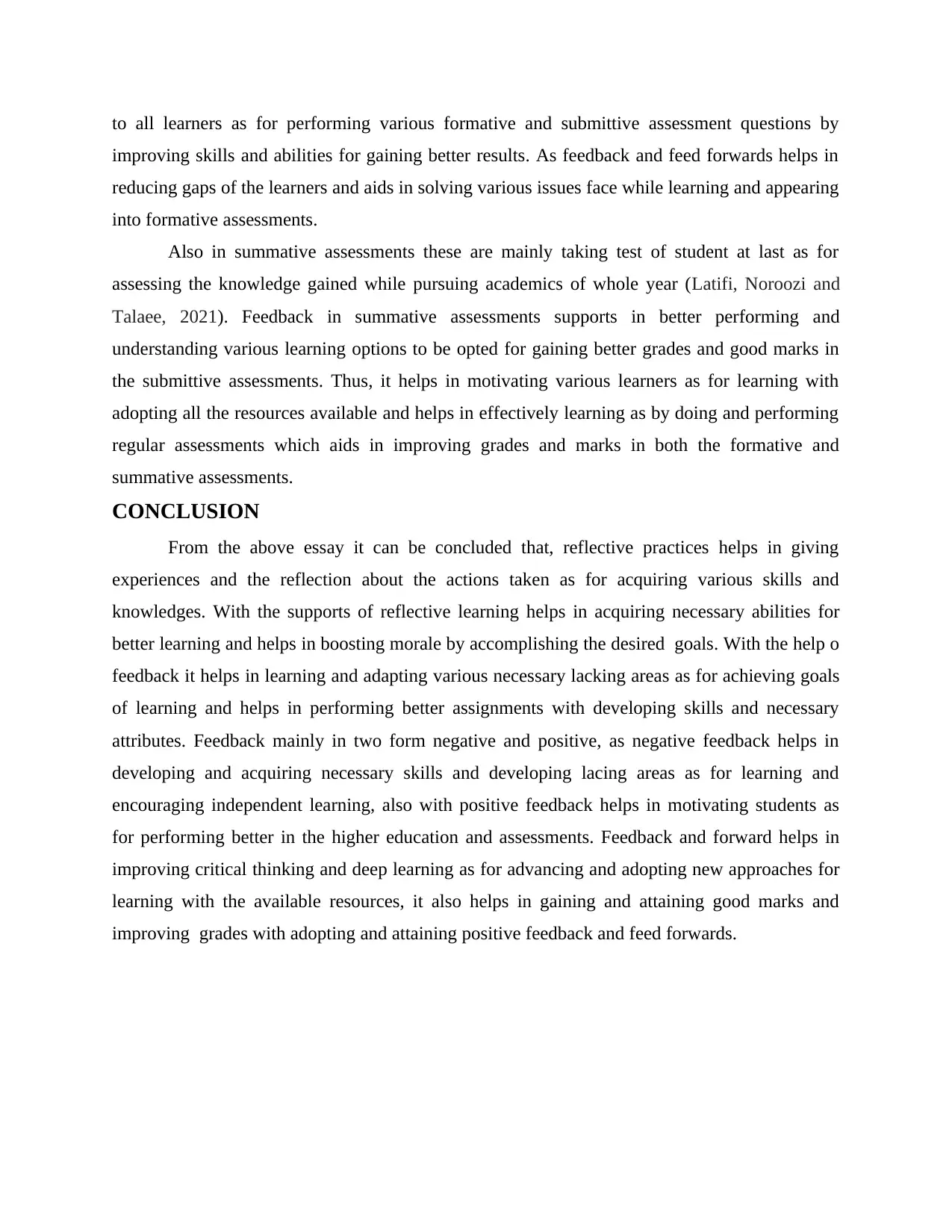
to all learners as for performing various formative and submittive assessment questions by
improving skills and abilities for gaining better results. As feedback and feed forwards helps in
reducing gaps of the learners and aids in solving various issues face while learning and appearing
into formative assessments.
Also in summative assessments these are mainly taking test of student at last as for
assessing the knowledge gained while pursuing academics of whole year (Latifi, Noroozi and
Talaee, 2021). Feedback in summative assessments supports in better performing and
understanding various learning options to be opted for gaining better grades and good marks in
the submittive assessments. Thus, it helps in motivating various learners as for learning with
adopting all the resources available and helps in effectively learning as by doing and performing
regular assessments which aids in improving grades and marks in both the formative and
summative assessments.
CONCLUSION
From the above essay it can be concluded that, reflective practices helps in giving
experiences and the reflection about the actions taken as for acquiring various skills and
knowledges. With the supports of reflective learning helps in acquiring necessary abilities for
better learning and helps in boosting morale by accomplishing the desired goals. With the help o
feedback it helps in learning and adapting various necessary lacking areas as for achieving goals
of learning and helps in performing better assignments with developing skills and necessary
attributes. Feedback mainly in two form negative and positive, as negative feedback helps in
developing and acquiring necessary skills and developing lacing areas as for learning and
encouraging independent learning, also with positive feedback helps in motivating students as
for performing better in the higher education and assessments. Feedback and forward helps in
improving critical thinking and deep learning as for advancing and adopting new approaches for
learning with the available resources, it also helps in gaining and attaining good marks and
improving grades with adopting and attaining positive feedback and feed forwards.
improving skills and abilities for gaining better results. As feedback and feed forwards helps in
reducing gaps of the learners and aids in solving various issues face while learning and appearing
into formative assessments.
Also in summative assessments these are mainly taking test of student at last as for
assessing the knowledge gained while pursuing academics of whole year (Latifi, Noroozi and
Talaee, 2021). Feedback in summative assessments supports in better performing and
understanding various learning options to be opted for gaining better grades and good marks in
the submittive assessments. Thus, it helps in motivating various learners as for learning with
adopting all the resources available and helps in effectively learning as by doing and performing
regular assessments which aids in improving grades and marks in both the formative and
summative assessments.
CONCLUSION
From the above essay it can be concluded that, reflective practices helps in giving
experiences and the reflection about the actions taken as for acquiring various skills and
knowledges. With the supports of reflective learning helps in acquiring necessary abilities for
better learning and helps in boosting morale by accomplishing the desired goals. With the help o
feedback it helps in learning and adapting various necessary lacking areas as for achieving goals
of learning and helps in performing better assignments with developing skills and necessary
attributes. Feedback mainly in two form negative and positive, as negative feedback helps in
developing and acquiring necessary skills and developing lacing areas as for learning and
encouraging independent learning, also with positive feedback helps in motivating students as
for performing better in the higher education and assessments. Feedback and forward helps in
improving critical thinking and deep learning as for advancing and adopting new approaches for
learning with the available resources, it also helps in gaining and attaining good marks and
improving grades with adopting and attaining positive feedback and feed forwards.
⊘ This is a preview!⊘
Do you want full access?
Subscribe today to unlock all pages.

Trusted by 1+ million students worldwide
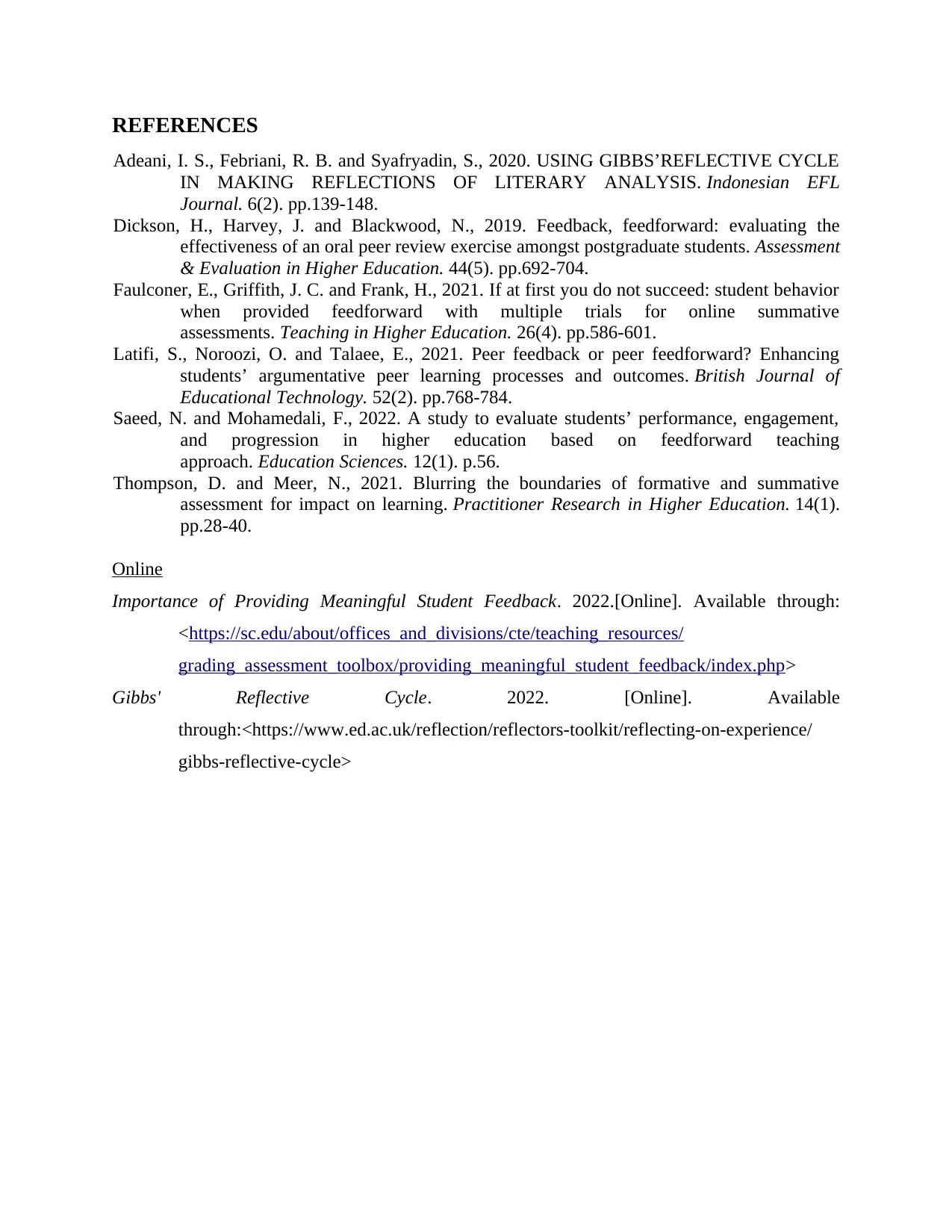
REFERENCES
Adeani, I. S., Febriani, R. B. and Syafryadin, S., 2020. USING GIBBS’REFLECTIVE CYCLE
IN MAKING REFLECTIONS OF LITERARY ANALYSIS. Indonesian EFL
Journal. 6(2). pp.139-148.
Dickson, H., Harvey, J. and Blackwood, N., 2019. Feedback, feedforward: evaluating the
effectiveness of an oral peer review exercise amongst postgraduate students. Assessment
& Evaluation in Higher Education. 44(5). pp.692-704.
Faulconer, E., Griffith, J. C. and Frank, H., 2021. If at first you do not succeed: student behavior
when provided feedforward with multiple trials for online summative
assessments. Teaching in Higher Education. 26(4). pp.586-601.
Latifi, S., Noroozi, O. and Talaee, E., 2021. Peer feedback or peer feedforward? Enhancing
students’ argumentative peer learning processes and outcomes. British Journal of
Educational Technology. 52(2). pp.768-784.
Saeed, N. and Mohamedali, F., 2022. A study to evaluate students’ performance, engagement,
and progression in higher education based on feedforward teaching
approach. Education Sciences. 12(1). p.56.
Thompson, D. and Meer, N., 2021. Blurring the boundaries of formative and summative
assessment for impact on learning. Practitioner Research in Higher Education. 14(1).
pp.28-40.
Online
Importance of Providing Meaningful Student Feedback. 2022.[Online]. Available through:
<https://sc.edu/about/offices_and_divisions/cte/teaching_resources/
grading_assessment_toolbox/providing_meaningful_student_feedback/index.php>
Gibbs' Reflective Cycle. 2022. [Online]. Available
through:<https://www.ed.ac.uk/reflection/reflectors-toolkit/reflecting-on-experience/
gibbs-reflective-cycle>
Adeani, I. S., Febriani, R. B. and Syafryadin, S., 2020. USING GIBBS’REFLECTIVE CYCLE
IN MAKING REFLECTIONS OF LITERARY ANALYSIS. Indonesian EFL
Journal. 6(2). pp.139-148.
Dickson, H., Harvey, J. and Blackwood, N., 2019. Feedback, feedforward: evaluating the
effectiveness of an oral peer review exercise amongst postgraduate students. Assessment
& Evaluation in Higher Education. 44(5). pp.692-704.
Faulconer, E., Griffith, J. C. and Frank, H., 2021. If at first you do not succeed: student behavior
when provided feedforward with multiple trials for online summative
assessments. Teaching in Higher Education. 26(4). pp.586-601.
Latifi, S., Noroozi, O. and Talaee, E., 2021. Peer feedback or peer feedforward? Enhancing
students’ argumentative peer learning processes and outcomes. British Journal of
Educational Technology. 52(2). pp.768-784.
Saeed, N. and Mohamedali, F., 2022. A study to evaluate students’ performance, engagement,
and progression in higher education based on feedforward teaching
approach. Education Sciences. 12(1). p.56.
Thompson, D. and Meer, N., 2021. Blurring the boundaries of formative and summative
assessment for impact on learning. Practitioner Research in Higher Education. 14(1).
pp.28-40.
Online
Importance of Providing Meaningful Student Feedback. 2022.[Online]. Available through:
<https://sc.edu/about/offices_and_divisions/cte/teaching_resources/
grading_assessment_toolbox/providing_meaningful_student_feedback/index.php>
Gibbs' Reflective Cycle. 2022. [Online]. Available
through:<https://www.ed.ac.uk/reflection/reflectors-toolkit/reflecting-on-experience/
gibbs-reflective-cycle>
1 out of 7
Related Documents
Your All-in-One AI-Powered Toolkit for Academic Success.
+13062052269
info@desklib.com
Available 24*7 on WhatsApp / Email
![[object Object]](/_next/static/media/star-bottom.7253800d.svg)
Unlock your academic potential
Copyright © 2020–2026 A2Z Services. All Rights Reserved. Developed and managed by ZUCOL.




